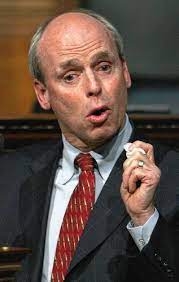Has Tom Finneran ever supported a tax cut? Not those inscrutable Weld-era cuts that benefited only Internet providers with a single sales factor every third Thursday in months ending in 'r.' A real tax cut: Has the speaker of the House ever backed a permanent rollback in the broad-based taxes — income, property, sales — that give Massachusetts the third-highest tax burden in America?
 House Speaker Thomas Finneran |
When I put the question to him after his grand oration on Monday, he gamely came up with three: 1) the repeal of the Dukakis surtax in 1986; 2) the phaseout of the estate tax; and 3) the increase in the deduction for dependent children.
Nice try. But the speaker knows well that 1) the Legislature undid the surtax only when it was clear the voters were about to repeal it anyway; 2) phasing out the estate tax, while admirable, was hardly a broad-based cut; and 3) the boost in the dependent deduction was merely an overdue adjustment for inflation.
An honest reading of Finneran's record shows that he never supports tax cuts for ordinary citizens. If his remarks the other day are any indication, he isn't planning on doing so any time soon.
In his speech, Finneran extolled "prudence, sobriety, sacrifice, restraint, and self-discipline."He urged "a resistance to whim or caprice or superficial fashion." He called, Alan Greenspan-like, for standing fast against "irrational exuberance." Through a forest of synonyms, his meaning came through clearly. Tommy to taxpayers: Drop dead.
Taxpayer advocates, especially the grass-roots group Citizens for Limited Taxation & Government, want to roll back the 5.95 percent income tax rate to 5 percent, which is where it stood before being temporarily raised in 1989. (Legislators at the time promised — i.e., lied — that the hike would last only 18 months. That was 102 months ago.) This modest reduction is what Finneran calls whim, caprice, irrational exuberance, and a lack of restraint.
But if it is irrational exuberance to roll back a tax increase now, when revenues are flooding into the treasury faster than even the prodigal Legislature can spend it — when the surplus for the year gone by was a staggering $800 million — when the so-called "rainy day" reservoir, though newly widened and deepened, is overflowing — if this isn't the right time to lower taxes, when is?
Never.
For Finneran, as for his predecessor, the convicted felon Charles Flaherty (who was given a seat of honor and a standing ovation before the speaker's address on Monday), the time is never right for meaningful tax relief. Ditto for their counterparts in the Senate. For them as for Michael Dukakis, whose fiscal disciples they all are, taxes are never too high and spending is never too low.
For years, Finneran has made the argument he makes now: Taxes must not be cut because we may need the money for something else. Indeed, his speech was laced with all sorts of something-elses he'd like to spend taxpayers' dollars on, from the bottomless boondoggle of education reform to higher salaries for already high-salaried judges.
"Today," Finneran said, "it is premature to speculate about or commit to a particular course of action regarding tax cuts." Of course. Talk about how tax dollars can be spent is always appropriate; talk about letting taxpayers keep more of those dollars in the first place is always premature. So fiscal liberals always say.
Yes, fiscal liberals. There is a notion abroad that Finneran is a fiscal conservative, but he's nothing of the kind. He is in many ways a social conservative, but when it comes to taking other people's money and spending it, he's Dukakoid down to his spats. The 1998 budget enacted last summer with Finneran's robust support sent spending soaring by $1 billion over the previous year — a hike of 6.5 percent, the Massachusetts Taxpayers Foundation calculated: triple the rate of inflation. As tax revenues far above anything the 1997 budget had anticipated came pouring in, the speaker (and the Senate president) found an incredible array of government accounts to enrich. There was money for everything. Even raises for Finneran's allies.
There was no talk then of "prudence, sobriety, sacrifice, restraint." No fear of the "fevers associated with irrational exuberance." There was only a determination to use up all the money. To use it up on anything — except a tax cut.
It was just such behavior that triggered the Dukakis collapse. As tax revenues zoomed in the mid-1980s, spending was driven higher and higher, faster and faster. When revenue growth slowed, there was no way for the budget to maintain its pace. "Budget busters" wrought havoc. State officials played deceptive accounting tricks. The government's credit rating tumbled to the basement. Taxes and fees were jacked even higher — and Dukakis's reputation was stained forever.
But if taxes had been lowered in the good times instead of squandered, none of it would have happened.
In 1998, Finneran assures me, things will be different. Come April, he says, taxes will be lowered. "Not a nickel-and-dime tax cut. It will be a substantial one. It will be meaningful."
With your record, Mr. Speaker? After that speech? I doubt it.
But you can prove me wrong. Keep the promise you and your colleagues made 102 months ago. Roll the income tax back to 5 percent. And I'll take back what I said about your being a Dukakoid.
(Jeff Jacoby is a columnist for The Boston Globe).
-- ## --
Follow Jeff Jacoby on Twitter.
Discuss his columns on Facebook.
Want to read more? Sign up for "Arguable," Jeff Jacoby's free weekly email newsletter.

